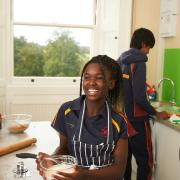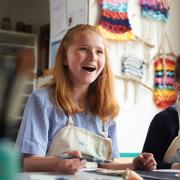School meals and food is often the last thing parents consider when choosing a school for their child. Chef Rob Rees argues that, if we want our children to grow into healthy adults, we need to get our priorities straight
Prunes and semolina – that is the food chef Rob Rees recalls from his school days – with a grimace.
“We didn’t have the global supply chain we do now. The tastes of young children was limited by what they ate. We, as adults and parents, don’t have that excuse now. “Children don’t understand what food is ‘exotic’ or nutritious. My young son happily ate his dried mango because he likes it, because it is good food.”
Rob was, more than 20 years ago, the first boy to take GCSE cookery at the independent school in Essex. He has grown up to be an advocate of understanding food. He has been involved with the Food Standards Agency, Kraft Health4Schools project, and the British Nutrition Foundation to name a few. He is now chairman of the School Food Trust.
Has cookery and the understanding and education of food improved since his school days?
“I recently returned to my old school and nothing had changed. Boys were still not encouraged to do food technology. So I asked why. “Well we train students here for high-level careers such as in law and in banking I was told. But look at me. I run my own businesses, I am chairman of the School Food Trust. I managed budgets in their millions. Is that not high level?”
Through his business and his charity, The Wiggly Worm, Rob works with children from inner city estates to well-heeled suburbs. Food education is not a class issue – so many of our children simply don’t know about food. Full stop.
“While there are some great projects out there which are really making a difference, we need many more. “When I visited my independent school I worked with some of the boys. They could not tell the difference between a spring onion and fennel, between peas and runner beans. Less than half of them had ever podded a pea.”
One of the greatest challenges a child faces when they join an independent school is understanding the choice in the dining area. Local authority schools, explains Rob, have an average 54p to spend on ingredients per child per meal. “So the choice in dining area is far less. But at independent schools, where more money is spent on catering, children are faced with a mind-boggling choice.
“This child, who at home, would have had food put on the table before them, is now faced with making decisions and we have done nothing to prepare them for that. So what will they do? Choose the unhealthy options of course and play safe.”
The Department of Education has recently released sensible new guidelines for food nurseries and early years. This Rob maintains is critical. “What we eat and how we eat is established between the ages of 0 to 4. Research shows that the better our children eat in this crucial period, the better the brain development, the better they will do in school and in life.
“Habits are set. Once you get beyond the age of four it becomes more and more difficult to change a child’s eating habits. “Good food improves behaviour and performance. A child who eats lunch and doesn’t skip it is likely to work better in the classroom. It’s commonsense.”
Rob believes parents should challenge schools more about food and the dining environment when considering where to send their children. “You need to ask what are the timings of meals. If your child is involved in extra-curricular activities as we would all hope, how will they eat their meals? Will the dining room be open or will they have to have packed lunches several days a week.
“From the age of 11, children start to eat on the hoof. It is important to help them understand that eating is a social activity. Parents need to ask how much time children have for meals. They need an average of 30 minutes so as not to rush their food and not stuff themselves. The average time allowed can be as little as 18.
“The school dining room needs to be quality and to encourage the social experience. Do children and teachers mix at the tables? Is conversation encouraged.” Independent schools, unlike local authority schools, are not required to follow Nutrition Standards as set out by the Department of Education. “That can mean independent schools are using higher levels of salt, fat and sugar than recommended. Parents need to ask.”
Rob is a passionate advocate of food policy – a whole school approach. That means food being an integral part of everything from science and math classes, to afternoon cookery clubs to policy of vending machines and what they offer, to the training of the catering team. It also includes ensuring all staff are eating balanced meal and not surviving on coffee and sandwiches.
“Food is so much more. You can turn it into a maths project. By growing food it becomes a biology project. By cooking it and understanding the chemical reactions it is science. “If we hope to change the culture of food and tackle the rising levels of obesity then everyone must be involved. Everyone must understand how food can enhance – and devastate – our lives.”
Rob’s one key message to schools? “Food technology is not a sissy subject. We are running out of food globally. Food is one of the most powerful political tools in the world yet we continue to downplay it in our children’s education.
“How do we make food sexy to children? We tell them that by eating properly their hair will be less greasy, they are likely to get fewer spots, they will feel better in themselves and look better.
“More schools run Cadets troops than they do after school cookery. Give me a child and I will teach them discipline. I will teach them to understand pressure and deadlines, to follow instructions, to work with others and to work on their own.
“Everything you do in the kitchen is a skill you can carry on into life. Not to mention the education in food and the sheer enjoyment of understanding what we eat.
“And they may just up employed in the food technology industry. Tell me, how many of them will get that much from Cadets.”
Rob Rees provides cookery and nutrition courses for children and catering and upskilling education for professionals.
http://www.thecotswoldchef.com
To learn more about the Wiggly Worm charity, visit http://www.thewigglyworm.org.uk


























